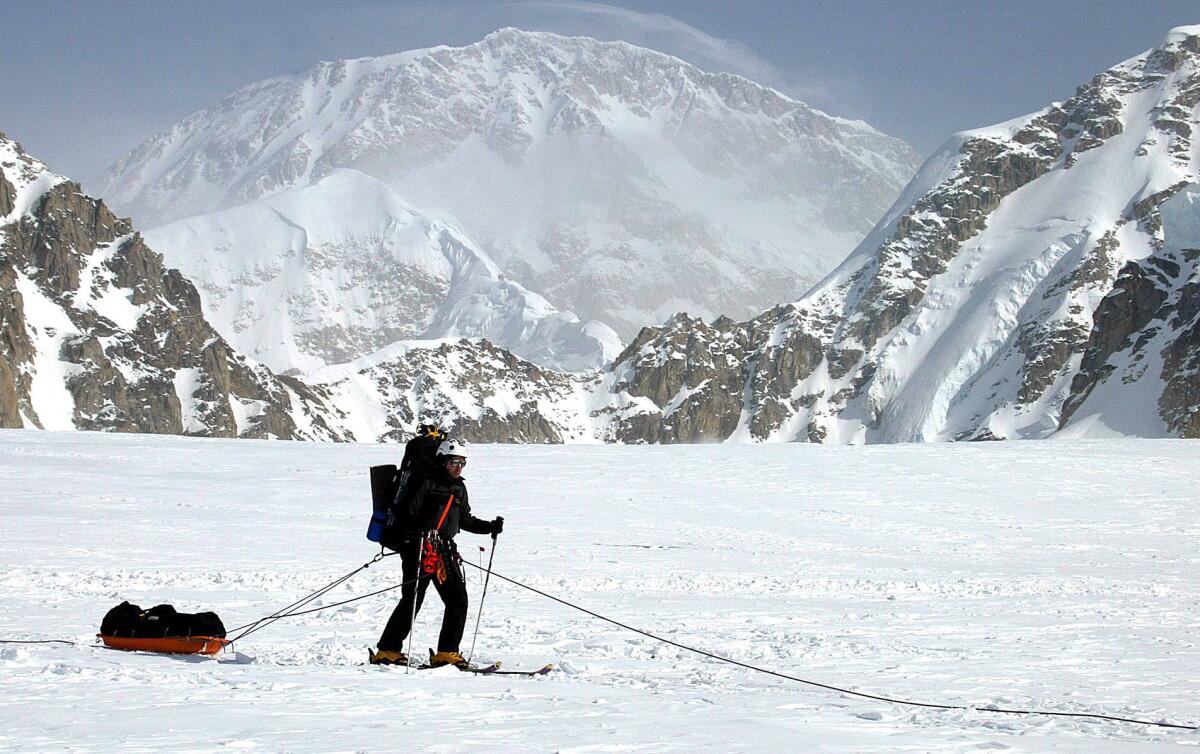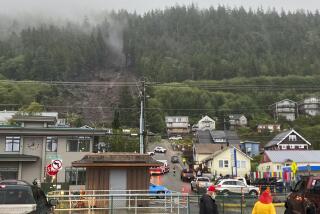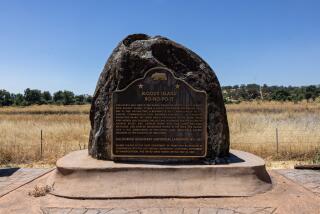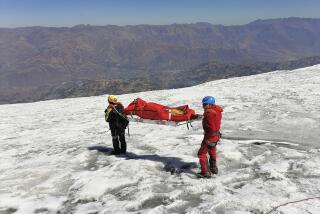Mt. McKinley, America’s tallest peak, is getting back its original name: Denali

A skier moves across the Kahiltna Glacier in Alaska with Mt. McKinley in the background in 2002.
North America’s tallest peak is getting a new name as the Obama administration resolves a decades-long dispute between Alaska and Ohio.
President Obama will announce Monday that his administration is officially redesignating Alaska’s Mt. McKinley as Denali, the original name for the 20,237-foot-high mountain given by the area’s Alaskan native population.
The announcement will come as the president begins a three-day visit to Alaska focused on the issue of climate change, one of Obama’s chief policy focuses as he enters his final year and a half in office.
“This name change recognizes the sacred status of Denali to many Alaska natives,” Interior Secretary Sally Jewell said in a statement, noting that the mountain had been known as Denali for generations.
According to the White House, a prospector called the peak Mt. McKinley as a tribute to William McKinley upon his nomination as a candidate for president in 1896, and “the name stuck.”
McKinley, the nation’s 25th president, was assassinated six months into his second White House term. He never set foot in Alaska.
The state of Alaska changed the mountain’s name to Denali, the native Koyukon Athabascan word for “The Great One” or “The High One,” in 1975. But the federal government retained McKinley’s moniker.
Sen. Lisa Murkowski (R-Alaska), chairwoman of the Senate Energy and Natural Resources Committee, had introduced legislation to change the federal designation. Alaska Republican Sen. Daniel Sullivan, who was born in Ohio, is a cosponsor.
Ohio’s congressional delegation, among others, has opposed removing the name of McKinley, who had been an Ohio governor.
Murkowski hailed Obama’s decision Sunday.
“For centuries, Alaskans have known this majestic mountain as the ‘Great One,’“ she said in a statement from Denali’s Ruth Glacier. “Today we are honored to be able to officially recognize the mountain as Denali. I’d like to thank the president for working with us to achieve this significant change to show honor, respect and gratitude to the Athabascan people of Alaska.”
Alaska Gov. Bill Walker also lauded the change. “Alaska’s place names should reflect and respect the rich cultural history of our state, and officially recognizing the name Denali does just that,” he said in a statement.
In February, as Murkowski discussed her legislation, she told The Times, “There’s a lot of things in Ohio that are already named after McKinley. This is no affront to our former president; this is all about ensuring that respect for the land and respect for the native people of the region is afforded.”
Ohio Rep. Bob Gibbs, a fellow Republican who has introduced a House bill aimed at retaining McKinley’s name on the peak, could not immediately be reached for comment Sunday.
Gibbs’ measure would prevent the U.S. Board on Geographic Names from considering Alaska’s attempts to change the mountain’s name under a policy that says no landmark titles can be considered if related legislation is pending before Congress.
Ohio representatives file such a bill every two years to essentially stymie Alaska’s efforts.
The White House said Sunday that Jewell has the authority to make the change. Obama has taken a number of actions in the last year through his executive authority, often to GOP consternation.
The Interior Department’s statement noted that in 1975, Alaska Gov. Jay S. Hammond had asked that the mountain be renamed Denali, but that the U.S. Board on Geographic Names had failed to act “in deference to potential congressional action.” Jewell’s decision resolves the 1975 petition, the department said.
“With our own sense of reverence for this place, we are officially renaming the mountain Denali in recognition of the traditions of Alaska natives and the strong support of the people of Alaska,” Jewell said.
During Obama’s Alaska visit, he will view the effects of climate change firsthand. He’ll take a hike at the Exit Glacier of Kenai Fjords National Park near Seward and a ride aboard a Coast Guard cutter.
On Wednesday, he’ll visit communities in the Arctic region, becoming the first president to travel there while in office.
For the local population, White House advisors say, climate change is a “present-tense issue.” Rising sea levels and coastal erosion claim a football-field-size parcel of land each day, requiring citizens to consider extreme steps like the relocation of entire communities to survive, they say.
On Monday, Obama will address the GLACIER Conference in Anchorage, which includes representatives of other Arctic nations. Later, he will meet with state officials and representatives from Alaskan native populations, when the Denali announcement will come.
The president is not scheduled to visit Denali.
Times staff writers Kurtis Lee and Connie Stewart in Los Angeles and Maria L. La Ganga in Alaska contributed to this report.
Follow @mikememoli for more news out of Washington.
MORE:
This is climate change: Alaskan villagers struggle as island is chewed up by the sea
Taxpayers have never paid more for public worker pensions, but it’s still not enough
Kentucky clerk who opposes same-sex marriage turns to Supreme Court for help
More to Read
Sign up for Essential California
The most important California stories and recommendations in your inbox every morning.
You may occasionally receive promotional content from the Los Angeles Times.











